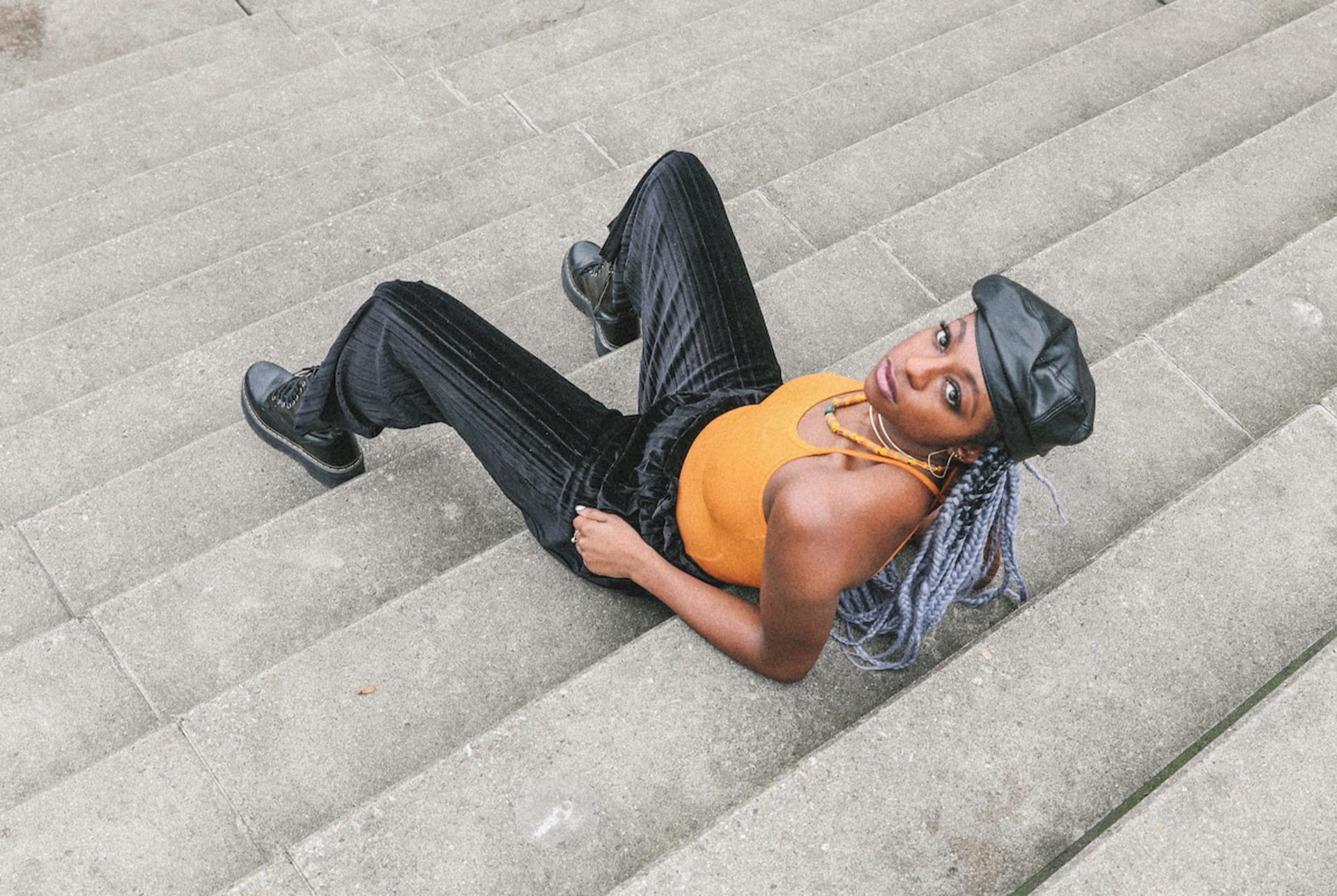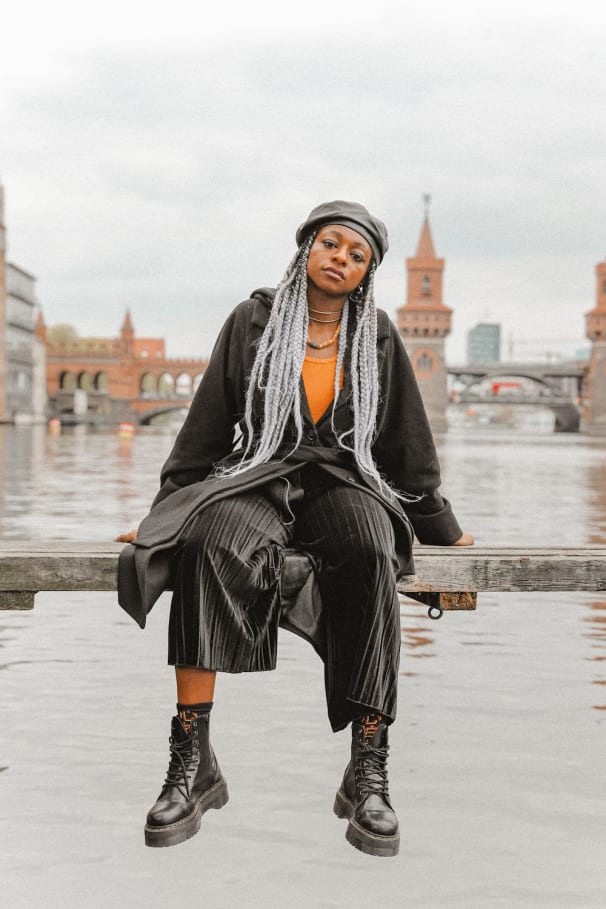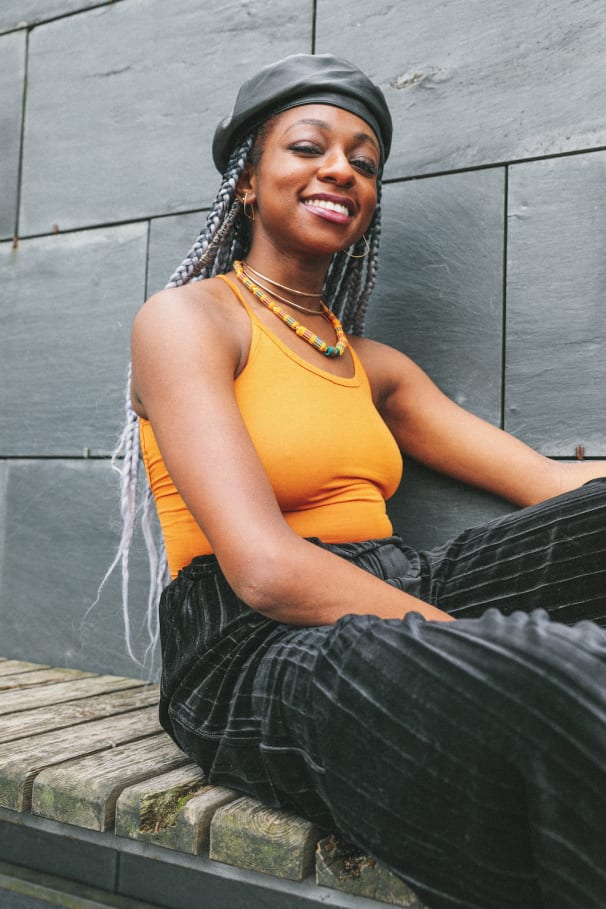
Meet Kikelomo: The London-Born DJ Bringing UK Sounds To The Berlin Underground
Though she's only been DJing for less than two years, Berlin-based DJ Kikelomo has already made a name for herself thanks to her intense sets that mix up grime, funky and other UK-derived genres.
It’s often those intimate, 100-person capacity venues where DJs reveal the strength of their craft. Removed of crowd expectations and the genre precedents of established clubs, a sense of daring thrives in these permissive environs. On an overcast Thursday night in late March, at a bar basement tucked away in the winding streets of Berlin’s Neukölln district, DJ Kikelomo (real name Kike Oludemi) is rising to the occasion. Her set cross-pollinates between flashes of bashment, ballroom and UK bass derivatives. It’s clear there are no inhibitions here. Within minutes of her ascent to the decks, people suddenly materialize onto the formerly empty dancefloor from Sameheads’ various subterranean crevices. Those with lit cigarettes trace intricate smoke trails as they dance along to the bass. When Kikelomo performs, she doesn’t just select—she summons.
Only a year and a half into DJing, Oludemi bears the laurels to prove it. She is an affiliate of the No Shade collective and DJ mentorship program for women, non-binary and trans individuals. She is a presenter for her monthly show “Pass the Aux” on Cashmere Radio, a Boiler Room host and a full-time project manager for Native Instruments. She’s played at Panorama Bar at CTM festival, at Splash Festival with hip-hop crew Hoe_mies, twice opened for Skepta’s BBK crew and recently returned from DJing throughout Seoul and Tokyo. Adidas Originals x Girls Are Awesome even approached her to design a T-shirt in collaboration with local streetwear shop Overkill, which she embossed with traditional Nigerian Ankara patterns as a nod to her heritage and a “Still I Rise” quote from Maya Angelou. This summer, she’s also booked to play the European version of Burning Man, Fusion Festival.
The momentum Kikelomo has experienced in her still nascent career is unusual, but not surprising. Her bookings reflect her considerable DJ abilities. Her roots in London mean she’s a natural fit at grime nights and her links with Hoe_mies and No Shade means she’s able to flit between hip-hop and experimental club lineups just as easily. Adeptly navigating Berlin’s overlapping club scenes is only half the recipe for her success. The other half is using her profession as an extension of her empathy. Her DJ philosophy revolves around a sense of emotional vitality. “I pick up on mood changes very quickly,” she says, “Ultimately, there’s a healing process in terms of giving something to a crowd and helping them feel good. Listening to great music is a transformative experience.”
Oludemi’s DJing style, as once described by her fellow No Shade affiliate AUCO, consists of “rapid-fire bangers with short transitions.” Kikelomo’s sets swagger with the visceral defiance of bass and percussion, as well as reference her Nigerian background. This, alongside “tracks with a bit of soul,” complete her sound. One staple genre you can expect from her eclectic selection is funky house. “It just covers all the bases, you know?” she insists. “It’s the perfect crossover between the electronic, the grime, the Afro- and the garage elements.”
Kikelomo’s current home is known for its lackadaisical drift, so her own work ethic is utterly self-imposed. “Particularly being in Berlin, there’s a danger of being lost in the hedonism,” she says between sips of red wine. She just got her hair done into silvery-purple braids and occasionally pushes them back to punctuate her points. “But there are certain elements when it comes to discipline, when it comes to personality and the way people have been brought up that allow them to occupy spaces that other people can easily get lost in. That is something I think I’m lucky enough to have.” To this end, Oludemi credits the rigorous demands of her engineering degree, the breakneck speeds of her native home London and her African upbringing for this high function. Her laser-like focus is perhaps even more surprising knowing, as she puts it, ”DJing was an accident.”


Growing up in West London, she remembers her childhood spent sifting through her parent’s music collection and discovering the Miseducation Of Lauren Hill, Stevie Wonder’s Songs in the Key of Life, and buying those lurid, guilty pleasure compilations such as Now That’s What I Call Music. This natural proclivity for record digging was second only to her love of radio. “Daytime car drives were Hot FM then the nighttime drives were either Jazz FM, or—if you’re feeling more urban—Kiss FM,” she remembers.
These formative moments are what led Oludemi to study engineering at university, in hopes that the sciences would lend her competitive edge in the broadcasting industry. After graduating with high marks, she enjoyed brief stint of post-collegiate freedom binge-watching all thirteen seasons of Grey’s Anatomy. “Honestly, one of my greatest achievements: 24 episodes in a season, 41 minutes per episode, hours, hundreds of hours of television, accomplished in two weeks,” Kike jokes. She says she pushed her rare period of idleness to its breaking point, and then spontaneously moved to Berlin in August 2016. She set about this fresh start with vigor. “I actually intentionally cut some connections to people I already knew in Berlin, just to allow myself the space to grow,” she says. Her acclimation included cold emailing Cashmere Radio for a grime slot, discovering the all-woman Facebook group Sister, and, through this, applying to join the first generation of No Shade mentees. Before the DJ program was finished in September 2017, she had already booked her first gig for grime party Gang Gang with East London MC Jammz as the headliner.
Even with the accelerated strides Kikelomo has made in the club scene, there still exist those prickling moments of doubt. She comes from a background where high expectations are the norm. For the first time, there are no outside forces dictating the standards, but rather internal ones. “Sometimes, I’ve thought I haven’t worked for any of the opportunities I’ve received,” she reflects. “I had this huge level of imposter syndrome, but, no, I have. I’m just not being pushed over the edge of where I want to go.”
The pressures of entertaining strangers nearly every weekend comes with the price of mental health. This past year has taught her an entirely new discipline: the power of saying no. For her, this means combatting “status symbol to be busy” and “knowing not every opportunity is for you.” It’s about disengaging from the toxicity of social media, “nourishing not just your body but your mind” with “nerdy” music podcasts like Dissect or losing herself in the fictional spaces of dystopian literature. It’s about realizing how to turn that ability to make others feel good, towards oneself.
“Being at near full capacity doesn’t allow you to handle trauma in other parts of your life,” Oludemi says. She speaks openly about investing in therapy in hopes of erasing its stigma. “One of the things I enjoy the most [about therapy] is getting a deeper understanding of myself, but also the way the world works and the way humans operate.”
These periods of recovery are integral to her artistry. This also means cultivating strong interpersonal networks outside of the club. On a Sunday in March, Kikelomo invites me to a group brunch at her apartment in Prenzlauer Berg. Multiple plates of fried rice, chicken wings and salads fit like Tetris tiles across the kitchen countertops. As she fries up plantains, her friends stream in through the door to add more dishes to the bounty. “Sometimes, I need those times to recuperate,” she says, “But, on the flip side, it can be engaging positive spaces—surrounding myself with people who I love and who love me.” For Kikelomo, Berlin nightlife is not the shadowy escapism it is so often known for, but rather an opportunity to manifest the abundance of her inner life, outward.
Published May 29, 2019. Words by Whitney Wei, photos by Ava Burnes.
